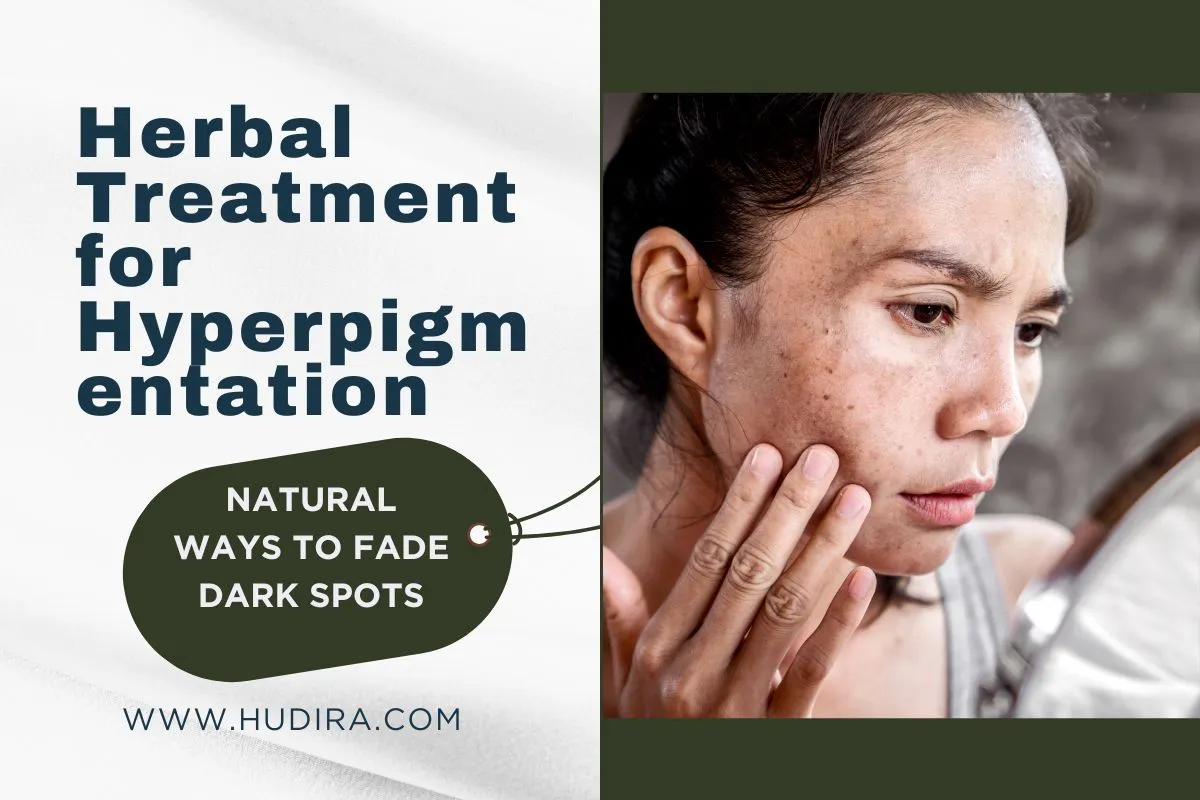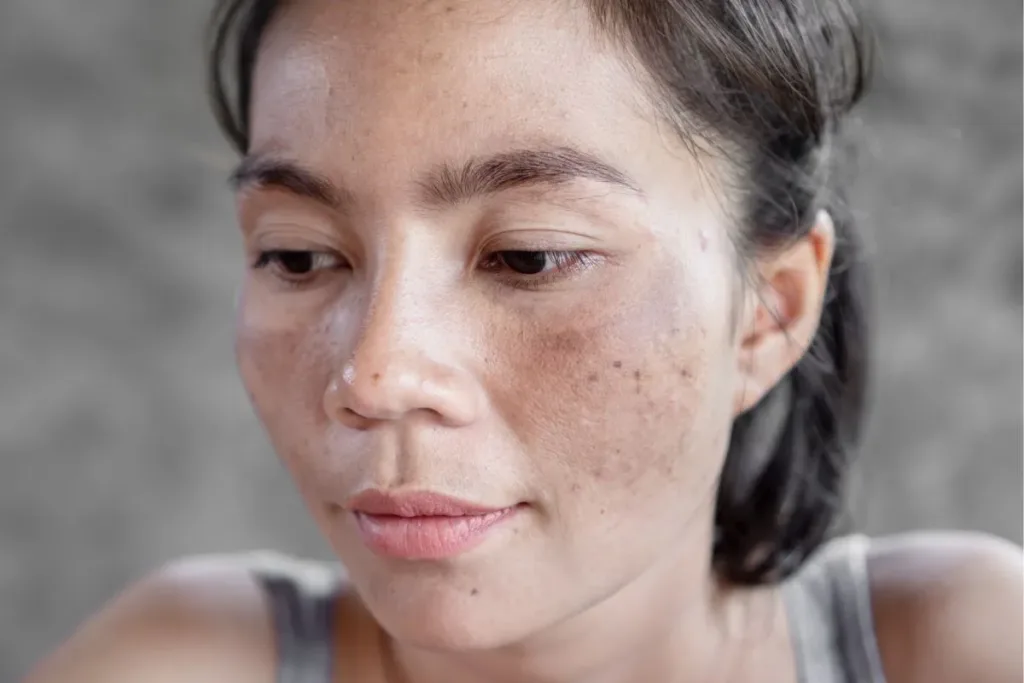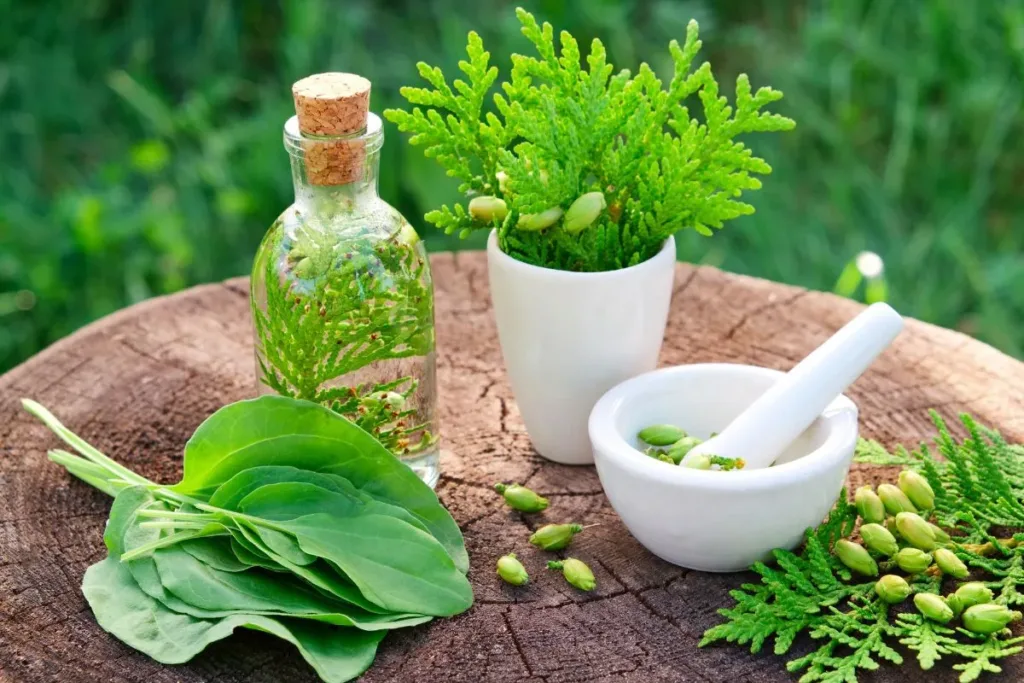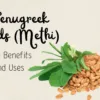No products in the cart.

Dark spots, uneven skin tone, and persistent pigmentation are more than just cosmetic concerns; they often affect our confidence, too. Whether it’s sun exposure, acne scars, or hormonal changes, hyperpigmentation is a skin challenge many of us face. While chemical treatments promise quick fixes, they often come with harsh side effects. This is where herbal treatment for hyperpigmentation steps in as a gentle, effective, and long-term solution rooted in nature.
But what if the secret to glowing, spot-free skin has been sitting in your kitchen cabinet all along? From time-tested Ayurvedic herbs to simple home-based remedies, nature holds powerful answers. In this blog, we uncover the most potent natural remedies for hyperpigmentation and dark spots, backed by science and tradition. Stick around you might just find the perfect herbal treatment for hyperpigmentation your skin has been waiting for.
What Causes Hyperpigmentation?

Before diving into natural remedies for hyperpigmentation, it’s crucial to understand what causes it. Hyperpigmentation occurs when an excess of melanin, the pigment responsible for skin color is produced. This can happen due to:
- Sun exposure
- Hormonal imbalances (like melasma)
- Acne scarring
- Post-inflammatory marks
- Skin injuries or inflammation
Now that you know what triggers it, let’s explore how herbs for hyperpigmentation can bring your skin back to balance.
Why Choose Herbal Treatment for Hyperpigmentation?

Herbal treatments are more than just skin-deep they align with your body’s natural rhythm and support healing from within. Here’s why choosing herbal treatment for hyperpigmentation makes sense:
- Gentle on Skin: No harsh acids or synthetic chemicals
- Anti-inflammatory & Antioxidant Power: Most herbs target both root causes of pigmentation
- Safe for Long-Term Use: Great for sensitive skin or hormonal pigmentation
- Sustainable & Eco-Friendly: Aligned with clean beauty standards like Hudira’s
Top 8 Natural Remedies for Hyperpigmentation and Dark Spots
1. Licorice Root – The Brightener
Licorice root is one of the most powerful and scientifically supported herbal treatments for hyperpigmentation. It contains a compound called glabridin, which inhibits the enzyme tyrosinase responsible for melanin production. This helps reduce the appearance of dark spots, melasma, and age spots.
Licorice also contains liquiritin, which helps disperse and break down existing melanin, making it effective not just at preventing pigmentation but also reversing it.
How to use: Mix 1 teaspoon of licorice powder with rose water or aloe vera gel. Apply a face mask 2–3 times a week. For quicker results, use serums containing licorice extract.
2. Turmeric – The Anti-Inflammatory Hero
Turmeric has been used for centuries in Ayurveda for skin brightening and healing. Its active compound curcumin has both anti-inflammatory and antioxidant properties that inhibit melanin production and soothe skin damage caused by UV rays, acne, and pollution.
Turmeric is particularly useful for post-inflammatory hyperpigmentation (PIH) , the dark spots left after acne or injuries.
DIY Tip: Mix 1 teaspoon of organic turmeric powder with aloe vera gel or yogurt. Apply a thin layer to pigmented areas and leave it on for 15 minutes before rinsing. Use 2–3 times a week.
3. Aloe Vera – The Skin Soother
Aloe vera is a versatile herb known for its calming and hydrating effects on the skin. Its compound aloesin is clinically proven to reduce melanin synthesis, making it highly effective for treating hyperpigmentation, especially when caused by sunburn or irritation.
It also promotes skin regeneration and healing, helping to fade scars and dark marks over time.
How to use: Apply fresh aloe vera gel directly to the affected areas at night. Let it absorb overnight and rinse in the morning. Combine with turmeric or licorice powder for enhanced effect.
4. Neem – The Detoxifier
Neem is a medicinal plant widely known for its antibacterial, anti-inflammatory, and detoxifying properties. It’s ideal for acne-prone or oily skin types where dark spots often result from acne scars.
Neem helps reduce melanin production while purifying the blood, which also helps internally combat pigmentation.
Usage Tip: Make a thick paste using neem powder or crushed leaves mixed with honey or rose water. Apply it as a mask twice a week to clarify the skin and fade spots.
5. Manjistha – The Blood Purifier
Manjistha (Rubia cordifolia) is a classic Ayurvedic herb used primarily to purify blood and promote lymphatic drainage. This internal cleansing effect often reflects on the skin as reduced dullness and fading of dark patches or melasma.
It contains natural compounds that block tyrosinase activity, helping prevent further pigment formation.
How to use: Take manjistha powder internally (as advised by a herbalist) or mix with rose water for topical use. Applying it as a mask 2–3 times a week helps improve skin tone and reduces pigmentation.
6. Sandalwood – The Natural Toner
Sandalwood is valued for its cooling, astringent, and skin-toning properties. It reduces inflammation and calms the skin, which helps in controlling pigmentation that arises from irritation, heat, or acne.
It’s especially beneficial for dark patches around the mouth, cheeks, and forehead.
DIY Mask: Mix sandalwood powder with raw milk or rose water to make a paste. Apply evenly to your face, leave for 15–20 minutes, and rinse off. Use 2–3 times weekly.
7. Fenugreek – The Gentle Exfoliator
Fenugreek (methi) seeds are packed with vitamin C, niacin, and flavonoids that help brighten skin and fade dark spots naturally. Its exfoliating nature removes dead skin cells that trap excess melanin, allowing new, even-toned skin to emerge.
Fenugreek also supports collagen production, giving your skin a youthful glow.
How to use: Soak 1 tablespoon of fenugreek seeds overnight. Grind into a fine paste and mix with plain yogurt or honey. Apply to your face for 15 minutes, then rinse. Use 1–2 times a week.
8. Green Tea Extract – The Antioxidant Powerhouse
Green tea is a skincare superstar known for its rich antioxidant content, particularly EGCG (epigallocatechin gallate). This compound reduces the activity of melanocytes, the cells that produce melanin. It also protects your skin from UV-induced pigmentation and oxidative damage.
Regular use of green tea helps fade sunspots and discoloration while tightening the skin.
How to use: Brew strong green tea, allow it to cool, and use it as a toner twice daily. For stronger effects, mix green tea extract powder with aloe vera gel and apply to pigmented areas as a mask 2–3 times weekly.
Herbal Face Mask Recipes to Try at Home
Brightening Blend
- 1 tsp turmeric
- 1 tbsp yogurt
- ½ tsp licorice root powder
Mix well and apply for 15 minutes, twice a week.
Cooling Pigmentation Pack
- 1 tbsp sandalwood powder
- 1 tsp rose water
- A few drops of aloe vera gel
Helps soothe and tone dull, pigmented skin.
These herbal treatment for hyperpigmentation natural remedies are safe, affordable, and effective perfect for Hudira’s clean skincare philosophy.
Lifestyle Tips to Support Natural Remedies for Hyperpigmentation
Pairing herbs for hyperpigmentation with healthy habits boosts your results. Here’s how:
- Wear sunscreen daily (even indoors!)
- Stay hydrated – water helps flush out toxins
- Eat skin-friendly foods like berries, leafy greens, turmeric, nuts
- Avoid harsh scrubs or bleaching creams
- Follow a consistent herbal skincare routine
Your skin needs time to heal and embrace the journey with patience and positivity.
Hudira’s Herbal Solution for Acne and Pigmentation
Our Anti-Acne Face Mask is enriched with turmeric, neem, and sandalwood three potent ingredients in herbal treatment for hyperpigmentation.
Click here to explore the Anti-Acne Mask by Hudira »
- Clears acne
- Fades dark spots
- Balances oil without dryness
This product is the perfect companion to your natural skincare journey.
Final Thoughts
Hyperpigmentation doesn’t have to define your skin journey. With the right blend of herbal treatment for hyperpigmentation, you can achieve glowing, even-toned skin naturally. Let nature do its magic—gently, effectively, and without compromise.
At Hudira, we believe in the power of pure ingredients. Start your herbal skincare journey today and rediscover your skin’s true radiance.
Explore Hudira’s Natural Skincare Range Now!
FAQs
Q. How to remove pigmentation from the face permanently naturally at home?
Use a combination of aloe vera, turmeric, and licorice root regularly. Consistency and sun protection are key for long-term results.
Q. Are herbal remedies safe for sensitive skin?
Yes. Most herbs for hyperpigmentation are gentle and soothing, but always do a patch test first.
Q. How long does herbal treatment for hyperpigmentation take to show results?
You may notice improvement in 3–4 weeks, but deeper spots may take up to 2–3 months.
Q. Can I use chemical and herbal treatment for hyperpigmentation together?
It’s best to avoid mixing. Choose a side and stick with it to avoid irritation.
Q. What’s the best time to apply herbal masks?
Evening is ideal, your skin heals overnight, and you avoid sun sensitivity.



Add comment